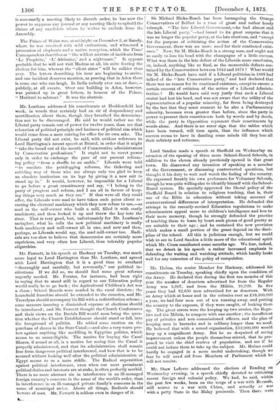Mr. Fawcett, in his speech at Hackney on Tuesday, was
much more loyal to Lord Hartington than Mr. Leatham, and agreed with Lord Hartington that it is a good time to overhaul "thoroughly and carefully, but reverently," our political in- stitutions. If we did so, we should find some great reforms urgently needed. Mr. Forster, for instance, had been right in saying that to stand still in regard to our Education policy would really be to go back ; the Agricultural Children's Act was a sham ; School Boards were needed in the rural districts ; the household franchise should be extended to the counties, and Mr. Trevelyan should accompany his Bill with a redistribution scheme ; some measure insuring a diminished expense at elections should be introduced ; and Mr. Fawcett thought the Church Conferences and their views on the Burials Bill would soon bring the ques- tion whether the Church Establishment should stand or fall, into the foreground of politics. He added some caution on the purchase of shares in the Suez Canal;—and also a very warm pro- test against anything like meddling in Egyptian politics, which seems to us unintelligible. The motive for buying the Canal Shares, if sound at all, is a motive for seeing that the Canal is properly administered, and that its administration shall remain free from dangerous political interference, and how that is to be secured without looking well after the political administration of Egypt seems to us a mere riddle. The Radical superstition against political interference, even when our most prominent political duties and interests are at stake, is often perfectly morbid. There is no more abstract sin in interference in an ill-managed foreign country's concerns in the name of the world's order, than in interference in an ill-managed private family's concerns in the name of municipal order. Above all things, Radicals should beware of cant. Mr. Fawcett is seldom even in danger of it.






































 Previous page
Previous page